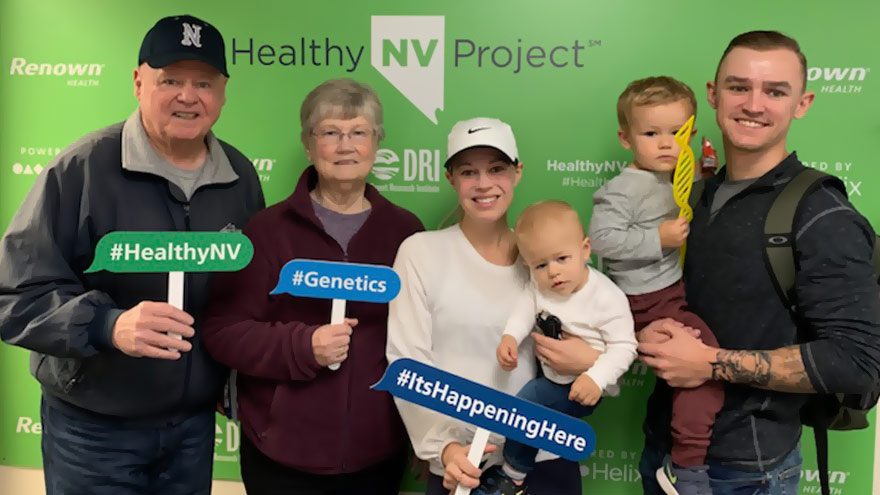Healthy Nevada Project Returning Clinical Results to Participants
October 02, 2018

The Healthy Nevada Project – a first-of-its-kind population health study combining genetic, clinical, social and environmental data – has reached another landmark milestone. The study is notifying study participants at risk for familial hypercholesterolemia, BRCA and Lynch syndrome.
“I took part in the Healthy Nevada Project to find out my ancestry. I didn’t even realize the test could give me so much information,” says 29-year-old Jordan Stiteler, who was recently diagnosed with familial hypercholesterolemia (also known as FH) through the Healthy Nevada Project.
“After my dad passed away suddenly at age 45, I learned I had high cholesterol but I didn’t know it was genetic and I didn’t get an FH diagnosis until last week,” Jordan explains. “I immediately changed my diet, started walking more and doing more cardio. I also set up an appointment with my primary care physician for the first time in a while. I’ve talked with my family and even strangers about testing since my diagnosis. I hope my story will inspire others to test and can save someone’s family from going through the same loss I did.”
Healthy Nevada Project Notifying Patients of Familial Hypercholesterolemia Risks
Jordan is among the first Healthy Nevada Project participants to receive clinical results from the genetic study led by Renown Institute for Health Innovation (Renown IHI) – a collaboration between Renown and the Desert Research Institute Foundation.
This groundbreaking population health study is now reaching out to study participants like Jordan, who asked to be notified of health risks. If study volunteers choose, the project will also provide guidance on treatment and additional testing for family members who may also be at risk.
The project is starting with the return of FH risks which is a genetic tie to high cholesterol. Just a few months ago, a paper in the Journal of the American College of Cardiology recommended genetic testing become the standard of care for patients with a definite or probable FH diagnosis. Jordan says she plans to have her young son tested as well.
“This is the future of health; not just reacting to sick people, but a coordinated effort between innovative technologies, data-driven researchers, and responsive practitioners to deliver personalized interventions to identify, prevent and treat disease,” says Anthony Slonim, M.D., Dr.PH., FACHE, president and CEO of Renown Health and president of Renown IHI. “As care providers, we often don’t see patients until they’re already sick and that’s a difficult problem. By embracing personal genomics, we can accelerate the ability of researchers to access data and apply those learnings back to our health system sooner.”
In the Months Ahead: Notification of BRCA1/2 & Lynch Syndrome Risks
The Healthy Nevada Project will start notifying study volunteers at risk for other CDC Tier 1 conditions including hereditary breast and ovarian cancer syndrome (BRCA 1/2 genes) and Lynch syndrome in the months ahead. These conditions are the key focus for the Healthy Nevada Project. The reason: Because early detection and treatment will save lives, and these conditions are some of the most common.
“This research allows us to look into cancer, cardiac, respiratory illness and beyond to identify underlying causes, assess real risks and eventually initiate appropriate preventive actions much earlier. Human subject research is often intangible to participants – we are treated as subjects. The Healthy Nevada Project is creating actionable information for our participants while engaging in leading-edge research on health determinants,” said Joseph Grzymski, Ph.D., associate research professor at DRI, principal investigator of the Healthy Nevada Project and chief scientific officer for Renown Health.
Landmark Population Health Study Continues to Expand
Since launching two years ago, the Healthy Nevada Project has quickly evolved and expanded. The pilot project enrolled 10,000 participants in just 48 hours in September 2016. In March 2018, phase two of project expanded to an additional 40,000 participants with genetic testing partner, Helix. Helix’s genomic sequencing provides participants and researchers greater depth and quality of DNA data. With this, they can gain further insights to improve health.
During a recent media roundtable announcing the return of clinical results, the Healthy Nevada Project also announced plans to complete testing of 40,000 people by the end of 2018. This will bring the project’s total enrollment to 50,000 people – approximately 10 percent of northern Nevada’s population.
The Healthy Nevada Project hopes to reach more than 250,000 people in its next phase. The ultimate goal is to offer genetic testing to every Nevadan interested in learning more about their genetics and health.
Join the Healthy Nevada Project
Recruitment for phase two is still open. In addition to opting in to receive clinical results, participants receive National Geographic’s Geno 2.0 ancestry app at no cost. They also have the chance to pick an additional app for health and wellness after completing a follow-up survey.